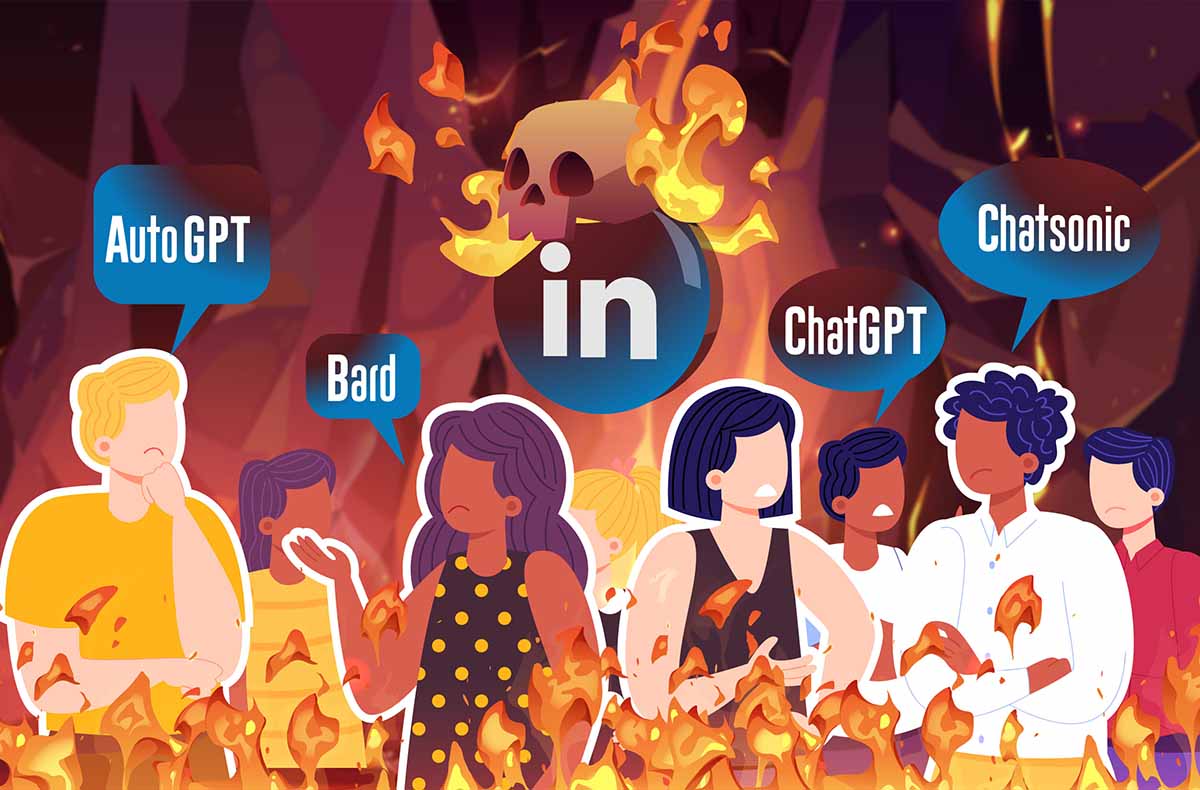
Illustration by Sarameeya Aree
Nick Slater explains how LinkedIn’s AI advocates are contributing to the collapse of industry:
LinkedIn is a bleak place at the best of times. If desperation is a stinky cologne, then the professional connection platform is like a high school prom, pervaded by a stench strong enough to violate the Geneva Convention. The insipid morality tales, corporate bromides, and misattributed Churchill quotes are nauseating enough on their own. But just as a dash of skunk musk gives perfume that little extra je ne sais quoi, so too do tech frenzies turn LinkedIn’s 9-to-5 purgatory into a hell realm of craving, fear, and delusion.
So it’s no surprise that LinkedIn’s most breathless thought leaders are enamored with generative AI. These tools are like the CBD of tech—add a splash of AI to anything, and suddenly, it sounds sexier (and easier to sell at a significant markup). Whether the expensive new ingredient makes a meaningful difference is beside the point—at least until people realize they’re paying for vibes.
Today, ChatGPT and its ilk are the new cannabinoids: highly versatile in theory, poorly understood in practice, and temporarily lucrative for those who can find ways to attract attention in a crowded theater where thousands of other patrons are also shouting “fire!”
Take the SEO hucksters, for example. Search engine optimization has been quietly ruining the internet for over a decade. All the low-hanging fruit has been plucked at this point; gone are the days when an e-commerce startup could dominate Google search results by plastering BEST PRICE ON [ITEM NAME] IN [YOUR TOWN]!!! on every product page. It’s no longer possible to convince most entrepreneurs that the one weird trick for achieving internet riches is “paying a neck-bearded 20-year-old a few grand to turn each page of your website into a 5,000-word novella.”
But what if the power of SEO could be combined with the power of AI to drive your site’s traffic from 0 visitors per month to 750,000 in the blink of an eye? That’s an eye-catching proposition, especially when accompanied by a slide show explaining how the LinkedIn guru’s company achieved such spectacular results.
Of course, a skeptic might point out that the underpants gnomes had a slideshow, too, one that was equally vague regarding the actual mechanism by which stealing underpants—or, in this case, cranking out thousands of ChatGPT-generated listicles—generates profit.
LinkedIn AI guys are ready for that one. ChatGPT is already old news, they say. The real game changer will be a new AI tool with almost the same name and functionality but with even more premium bells and cutting-edge whistles. Sure, last month’s hype cycle might already be fizzling out as people deploy the tech and come face-to-face with its limitations… but this month’s AI miracle box contains the answers to all your business problems.
Wait, though! Maybe the problem isn’t the AI tool but the user of the AI tool. Maybe you’re just doing it wrong. As one popular LinkedIn AI guy put it, “ChatGPT is free education. But 99% of people have no idea how to prompt it.” For example, if you wanted to learn what Jesus Christ would think of your plan to feed the hungry, just tell the AI to pretend it is Jesus Christ. Then input your plan, ask the AI for feedback, and hey, presto! Hunger solved.
If such an idea never occurred to you before, could that be because it’s earth-shakingly stupid? Some cynics in the comments seemed to think so. Then again, every era has its Luddites, says the wise LinkedIn AI guy.*
*Don’t bother asking him to tell you anything else about who the Luddites were, where they lived, or what values they held.
The arms race approach to AI boosterism has built-in limitations, though. The cleverest LinkedIn hustlers know that hitching one’s wagon to a single product places unnecessary constrictions on their scheme. Any given AI tool might soon turn out to be error-prone or dubiously legal, or terrible for the environment, so the safest route to monetizing one’s AI boosterism is to avoid talking about specifics whenever possible. This explains the recent explosion of handy lists of free AI courses, use cases, and so on.
This chipper, quietly ominous madness won’t last forever. Just as the spiritual forefathers of the LinkedIn AI guy—the metaverse guys, the NFT guys, the crypto guys, the augmented reality guys, the Internet of Things guys, and many other guys before them—were quietly exiled to the fringes of the algorithm, so too will the AI guys whimper and limp off into the distance once their promises of “revolution” are revealed to be empty. Their fates are unimportant and uninteresting; good luck and good riddance.
But what will they leave in their wake? Every day, LinkedIn AI guys dedicate themselves to profiting from the psychic anguish of strangers. They poison our communal wells of knowledge with fear-mongering, deceptive promises, and outright lies. Their actions will have impacts that outlast our memories of specific charlatans and scams. Post by post, newsletter by newsletter, free ebook by free ebook, they push people toward anxious misery.
It would be naive to suggest the LinkedIn AI guys should repent. But the least they could do is shut the fuck up.



